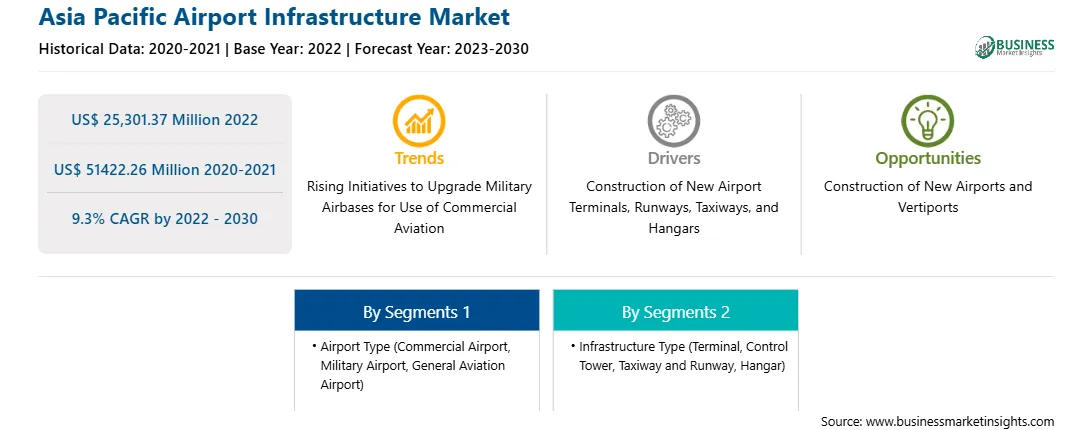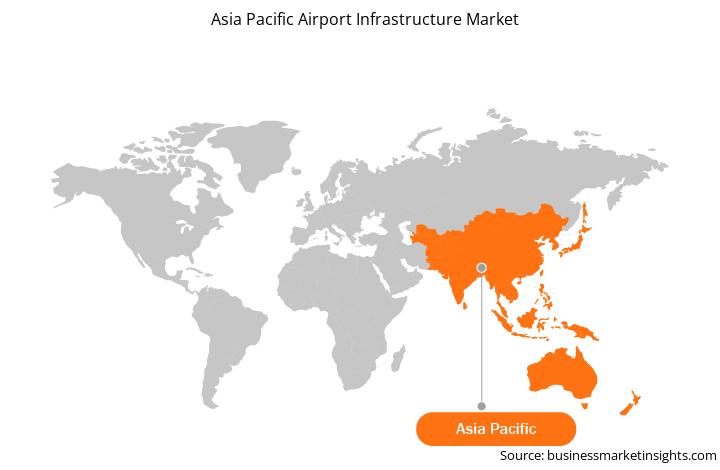The Asia Pacific airport infrastructure market was valued at US$ 25,301.37 million in 2022 and is expected to reach US$ 51422.26 million by 2030; it is estimated to record a CAGR of 9.3% from 2022 to 2030. Construction of New Airports and Vertiports Fuels the Asia Pacific Airport Infrastructure Market
Vertiports are centers for vertical takeoff and landing vehicles such as eVTOL vehicles, drones, and air taxis. The increasing demand for competent urban transportation and developments in eVTOL technology, and the shortage of available land to build conventional vertiports fuel the need for advanced vertiports.
In 2023, the Japanese vertiport firm Skyscape has unveiled ambitious new plans to build an "Integrated Aviation Centre," or "IAC," which will be among the nation's first vertiport establishments. Also, in 2022, Skyportz unveiled the design for Australia's first vertiport. The design was released at the AAM Summit.
The growing demand for sustainable and low-carbon emission approaches in the aviation and logistics sectors boosts the demand for new airports for eVTOL aircraft. The advancement of vertiports can transform urban strategies for efficient and eco-friendly city transport or logistic modes. Air pollution, traffic congestion, and the high expenditure on infrastructure are among the major challenges for vertiport construction. To mitigate these issues, lower travel time, reduce carbon emissions, and improve accessibility, vertiports are one of the most promising solutions. Vertiports are similar to helipads but developed for a wider range of aircraft. Vertiports can be situated in any location, including parking spaces, rooftops, and a few public spaces. In addition, vertiports are landing pads, but they can be used for other services such as maintenance facilities, charging stations, and passenger amenities. Thus, the growing construction of new vertiports is expected to create new opportunities for the airport infrastructure market growth in the coming years.Asia Pacific Airport Infrastructure Market Overview
Asia-Pacific's airport infrastructure is undergoing robust expansion and development initiatives, propelled by the region's surging economic growth, and increasing air travel demands. Key airports, including Singapore Changi, Beijing Capital International, and Incheon International, are pivotal hubs spearheading modernization projects. The focus extends beyond major hubs, with countries like Indonesia and Thailand investing in regional airports to improve connectivity. Currently, 155 Airport and airport infrastructure development projects with an investment of $209 billion in Asia Pacific are under development out of 425 across the globe. For example, one of the biggest airport development projects in the Asia Pacific is Long Thanh International Airport in Vietnam, which has an investment of $14.5 billion and is expected to be completed by 2025. In addition, the expansion of Terminal 5 at Changi Airport Singapore is a $10 billion project and is expected to be completed by 2030.
As Asia Pacific solidifies its position as a global aviation hub, these collective efforts ensure a resilient and advanced airport infrastructure that meets the evolving needs of the burgeoning air travel market.
Asia Pacific Airport Infrastructure Market Revenue and Forecast to 2030 (US$ Million )
Strategic insights for the Asia Pacific Airport Infrastructure provides data-driven analysis of the industry landscape, including current trends, key players, and regional nuances. These insights offer actionable recommendations, enabling readers to differentiate themselves from competitors by identifying untapped segments or developing unique value propositions. Leveraging data analytics, these insights help industry players anticipate the market shifts, whether investors, manufacturers, or other stakeholders. A future-oriented perspective is essential, helping stakeholders anticipate market shifts and position themselves for long-term success in this dynamic region. Ultimately, effective strategic insights empower readers to make informed decisions that drive profitability and achieve their business objectives within the market. The geographic scope of the Asia Pacific Airport Infrastructure refers to the specific areas in which a business operates and competes. Understanding local distinctions, such as diverse consumer preferences (e.g., demand for specific plug types or battery backup durations), varying economic conditions, and regulatory environments, is crucial for tailoring strategies to specific markets. Businesses can expand their reach by identifying underserved areas or adapting their offerings to meet local demands. A clear market focus allows for more effective resource allocation, targeted marketing campaigns, and better positioning against local competitors, ultimately driving growth in those targeted areas.Asia Pacific Airport Infrastructure Strategic Insights

Asia Pacific Airport Infrastructure Report Scope
Report Attribute
Details
Market size in 2022
US$ 25,301.37 Million
Market Size by 2030
US$ 51422.26 Million
Global CAGR (2022 - 2030)
9.3%
Historical Data
2020-2021
Forecast period
2023-2030
Segments Covered
By Airport Type
By Infrastructure Type
Regions and Countries Covered
Asia-Pacific
Market leaders and key company profiles
Asia Pacific Airport Infrastructure Regional Insights

Asia Pacific Airport Infrastructure Market Segmentation
The Asia Pacific airport infrastructure market is segmented based on airport type, infrastructure type, and country. Based on airport type, the Asia Pacific airport infrastructure market is segmented into commercial airport, military airport, and general aviation airport. The commercial airport segment held the largest market share in 2022.
By infrastructure type, the Asia Pacific airport infrastructure market is segmented into terminal, control tower, taxiway and runway, hangar, and others.The terminal segment held the largest market share in 2022.
In terms of country, the Asia Pacific airport infrastructure market is segmented into Australia, China, India, Japan, South Korea, and the Rest of Asia Pacific. China dominated the Asia Pacific airport infrastructure market share in 2022.
AECOM, Turner Construction company, PCL Constructors Inc, and Hill International Inc are some of the leading companies operating in the Asia Pacific airport infrastructure market.
1. AECOM
2. Turner Construction Company
3. PCL Constructors Inc
4. Hill International Inc
The Asia Pacific Airport Infrastructure Market is valued at US$ 25,301.37 Million in 2022, it is projected to reach US$ 51422.26 Million by 2030.
As per our report Asia Pacific Airport Infrastructure Market, the market size is valued at US$ 25,301.37 Million in 2022, projecting it to reach US$ 51422.26 Million by 2030. This translates to a CAGR of approximately 9.3% during the forecast period.
The Asia Pacific Airport Infrastructure Market report typically cover these key segments-
The historic period, base year, and forecast period can vary slightly depending on the specific market research report. However, for the Asia Pacific Airport Infrastructure Market report:
The Asia Pacific Airport Infrastructure Market is populated by several key players, each contributing to its growth and innovation. Some of the major players include:
The Asia Pacific Airport Infrastructure Market report is valuable for diverse stakeholders, including:
Essentially, anyone involved in or considering involvement in the Asia Pacific Airport Infrastructure Market value chain can benefit from the information contained in a comprehensive market report.